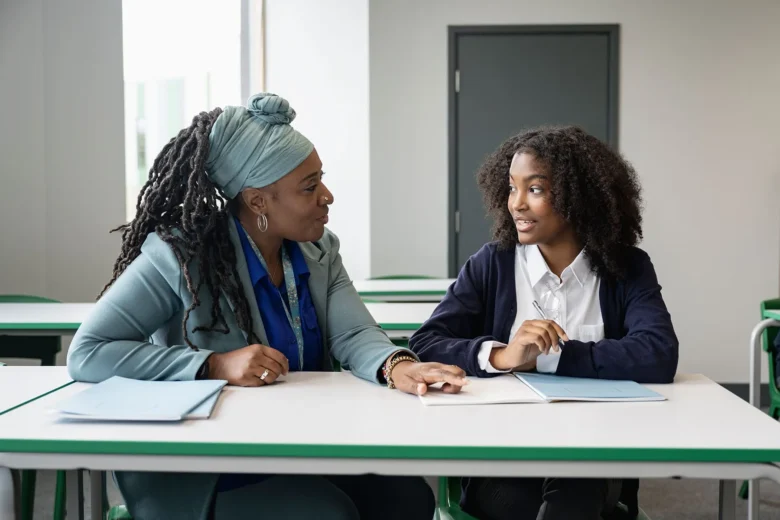The heartbeat of any thriving school is its dedicated group of teachers. Guiding them and helping them flourish are school leaders, especially the school principal. But the question arises, how can principals support teachers? The answers go beyond just providing resources. It’s about nurturing a positive school culture, encouraging continuous professional development and student achievement, and forging a strong sense of community.
Fostering a Positive School Culture
1. Setting the Tone
From the first school day, principals set the tone. By embodying respect, enthusiasm, and integrity, they create an atmosphere where teachers feel valued and motivated.
2. Encouraging Open Door Policies
Good principals always make themselves available. Open door policies don’t just mean a physical, open door policy; it signifies an open mind willing to listen, understand, and act. This kind of environment fosters trust and ensures teachers feel supported.
3. Prioritizing Social and Emotional Learning (SEL)
It’s not just students who benefit from a focus on SEL. Teachers, too, need support in this domain. When a principal emphasizes emotional learning for the entire school community, it creates a sensitive environment where staff members feel understood and cared for.
Professional Development: An Ongoing Process

Offering Growth Opportunities
A principal can back teachers by promoting continuous professional development. From attending workshops to joining class and peer collaboration sessions, these opportunities are essential for teacher growth.
Constructive Criticism & Meaningful Teacher Evaluations
Evaluating teaching isn’t just about pinpointing mistakes. It’s about offering constructive criticism that helps teachers improve. Meaningful evaluations look at classroom instruction holistically, considering the needs of both students and teachers.
Championing Teacher Innovations
Every teacher comes with their own set of brilliant ideas. Principals can support teachers, by providing a platform where these ideas are shared, refined, and implemented, fostering a sense of pride and ownership among educators.
Resources: The Cornerstones of Effective Teaching

Every teacher knows the value of their kids having the right resources at their fingertips. Whether it’s cutting-edge technology or traditional teaching aids, school administrators play a pivotal role in ensuring these resources are available.
Tools for the Classroom
In today’s digital age, integrating technology into classroom instruction has a big impact on student learning. Principals can back their teachers by ensuring they have access to the latest teaching tools and training on how to use them effectively.
Community & Parental Support
A principal’s role isn’t confined to the campus. By establishing strong relationships with parents and the school community, they can rally external support and create it for teachers, enriching the resources and backing available to them.
Emotional & Well-being Resources
Teaching is a demanding job, and teacher burnout is real. By offering resources focused on self-care, mental health, and emotional support, principals ensure that their teachers remain resilient in the face of challenges.
Communication: The Bedrock of Trust

Effective communication between principals and teachers is paramount. Without it, mistrust and confusion can flourish.
1. Active Listening
One of the core tenets of support is simply to listen. By practicing active listening, principals can understand teachers’ needs, concerns, and aspirations. It provides an avenue for teachers to feel heard and valued.
2. Regular Faculty Meetings
These aren’t just routine gatherings; they’re an opportunity. By organizing productive faculty meetings, principals can ensure that teachers are aligned with the school’s vision, updated on policy changes, and engaged in collective decision-making processes.
3. Encouraging Peer Collaboration
Promoting peer collaboration can lead to encouraging the cross-pollination of creative solutions, teaching strategies, and resources. As administrators, principals can set up platforms or periods during the school day where teachers can collaborate, discuss, and learn from each other.
Recognizing and Rewarding Hard Work

Acknowledgment goes a long way in motivating individuals. Recognizing the efforts of teachers and administrators is an integral part of building a positive school culture.
Celebrating Successes
Whether it’s a positive note from a teacher who’s made a breakthrough with a challenging student or one who’s introduced a brilliant new teaching strategy, recognizing and celebrating these successes boosts morale.
Providing Constructive Feedback
When teachers put in the hard work, they deserve feedback that helps them grow. Constructive criticism, when paired with genuine praise, ensures teachers continue in the right direction.
Mentorship Programs
For new teachers, the initial years can be daunting. By establishing mentorship programs and leadership styles, principals not only provide support to new entrants but also recognize the expertise of seasoned educators, empowering them to lead.
Involvement in Classroom Activities

The classroom is where the magic happens. For parents and principals to truly understand and support their teachers, they need to be a part of this magic.
Regular Classroom Visits
It isn’t about supervision; it’s about involvement. Regular visits show teachers that the principal is genuinely interested in classroom instruction and student discipline, and is there to offer guidance, not just evaluations.
Being Approachable
Whether a teacher is having a bad day or wants to share a success story, knowing that the principal is approachable can make a world of difference. An open-door policy, coupled with a genuine willingness to engage, can foster this environment.
Supporting Teacher Autonomy
While guidance is essential, so is trust. By trusting teachers to make instructional decisions and strategies that suit their unique classes, principals empower them to be the best educators they can be.
Support is a multifaceted gem, reflecting various shades of understanding, guidance, and empowerment. In the next section, we’ll delve deeper into the nuances of support and how principals can further enhance their role as the lynchpins of instructional leaders in their schools.
Frequently Asked Questions

How can principals empower teachers?
Principals can empower teachers by providing them with the resources they need, offering opportunities for professional development, encouraging autonomy in the classroom, and fostering a culture of mutual respect and trust. By actively listening to teachers’ needs and concerns and involving them in the decision-making process, principals can ensure that teachers feel valued and empowered to do their best.
How can school leaders support teachers’ well-being?
School leaders can support teachers’ well-being by recognizing and addressing the challenges they face, both in and out of the classroom. This can include providing resources for self-care, ensuring a balanced workload, offering emotional support, and fostering a positive school culture where teachers feel respected and appreciated. Additionally, regular check-ins and open-door policies can ensure that teachers have a platform to voice their concerns and seek guidance.
How do principals help struggling teachers?
Principals can assist struggling teachers by first understanding the root cause of their challenges. This can involve open conversations, observations, and seeking feedback. Once identified, principals can provide targeted professional development, pair them with mentor teachers, offer classroom resources, and ensure they have access to collaborative platforms. Above all, providing emotional support and showing confidence in their abilities can significantly boost a struggling teacher’s morale.
What do teachers want from their principals?
Teachers generally seek understanding, respect, support, and clear communication from their principals. They appreciate being recognized for their hard work, having access to resources that can aid in classroom instruction, and receiving constructive feedback to help them grow professionally. Moreover, teachers value being involved in decision-making processes and having a voice in matters that affect their classrooms and students.

